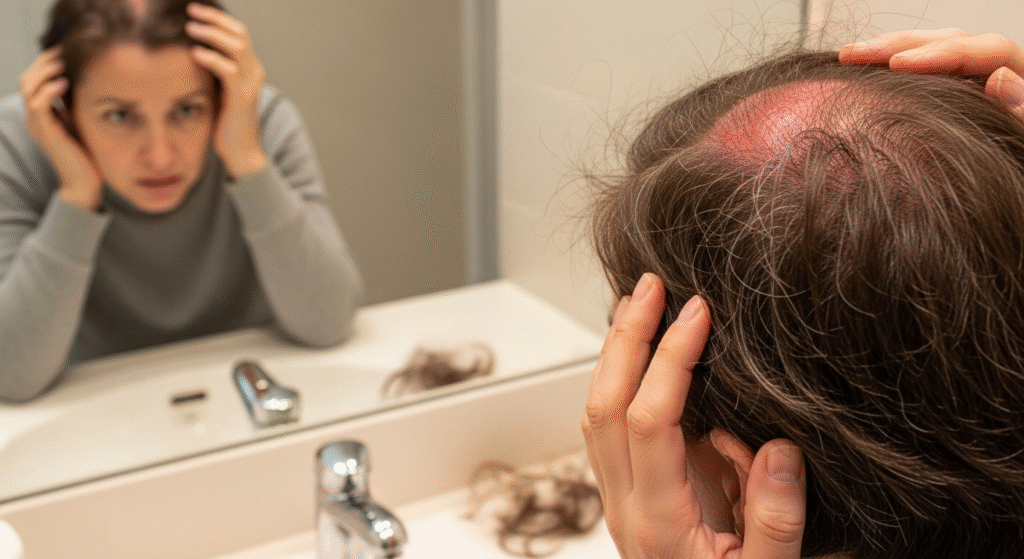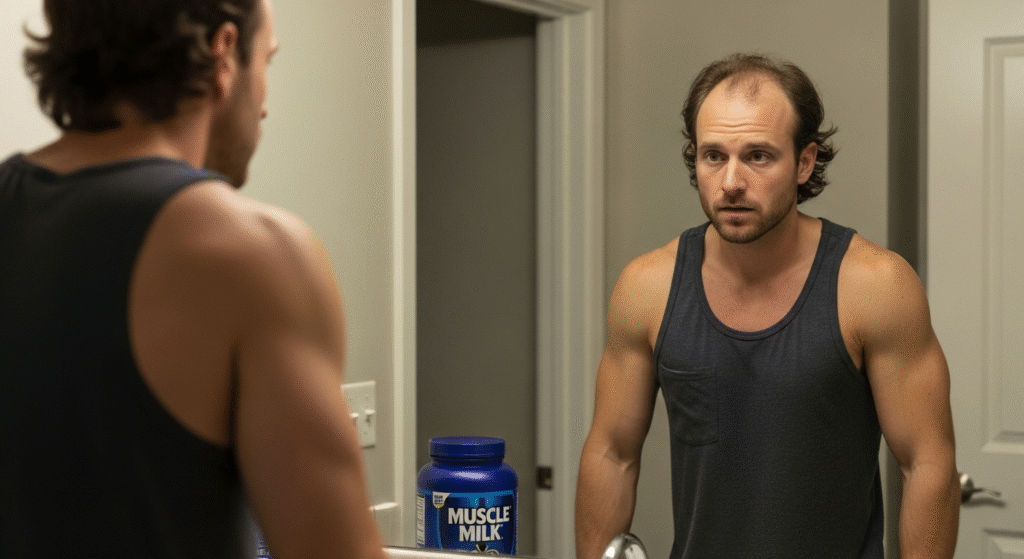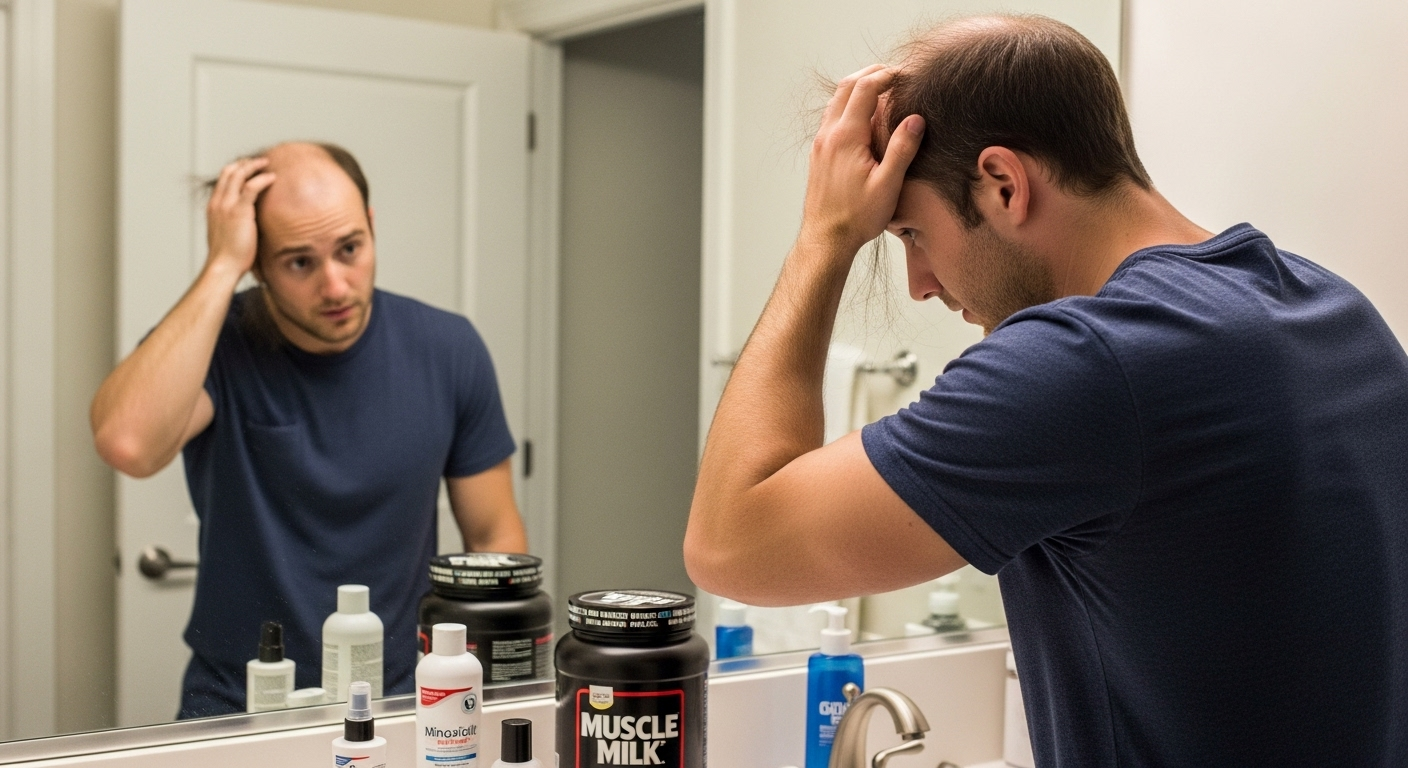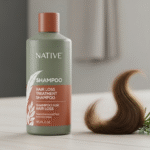Many people use Muscle Milk to boost protein intake, especially after workouts, but concerns have emerged regarding its side effects—particularly its potential connection to hair loss. Muscle Milk side effects and hair loss is a topic that often raises questions. In this article, we'll delve into the truth behind the claims, examine the ingredients in …
Many people use Muscle Milk to boost protein intake, especially after workouts, but concerns have emerged regarding its side effects—particularly its potential connection to hair loss. Muscle Milk side effects and hair loss is a topic that often raises questions.
In this article, we’ll delve into the truth behind the claims, examine the ingredients in Muscle Milk, and provide expert insights into whether this supplement contributes to hair thinning. By the end, you’ll have a clear understanding of the issue and how to make informed decisions about your health.

Understanding Muscle Milk and Its Ingredients
What Is Muscle Milk?
Muscle Milk is a popular protein supplement used to support muscle recovery and growth. It contains whey protein concentrate, casein, and a variety of added vitamins and minerals to help with post-workout recovery. These ingredients are commonly used in protein shakes to aid in muscle repair, energy replenishment, and overall physical performance.
Types of Muscle Milk Products
Muscle Milk is available in multiple forms, including ready-to-drink shakes and powdered supplements. Both versions are designed to provide high-quality protein, but the nutrient content can vary. Ready-to-drink shakes are convenient and provide a quick source of protein, while powdered versions allow users to control their serving size and mix with other ingredients.
- Ready-to-Drink Shakes: These offer convenience and fast absorption, perfect for busy individuals or immediate post-workout recovery.
- Powdered Supplements: These are versatile and can be mixed with smoothies or other drinks. They also tend to have fewer additives compared to pre-mixed options.
Muscle Milk is marketed as a convenient solution for athletes, bodybuilders, or anyone needing additional protein in their diet. But, do the ingredients come with any risks?
The Link Between Protein Supplements and Hair Health
Protein’s Role in Hair Growth
Protein plays a crucial role in maintaining healthy hair. Hair follicles are made mostly of protein, and consuming sufficient protein is vital for hair growth and strength. Without enough protein, hair can become weak, brittle, and more prone to falling out. That’s why many people turn to protein supplements like Muscle Milk to ensure they are meeting their daily protein needs.
Potential Side Effects of Protein Supplements
While protein is essential for hair and overall health, an excessive intake of protein, especially from supplements, can lead to certain side effects. Here are some potential issues associated with consuming too much protein:
- Digestive Issues: Protein supplements can cause bloating, gas, and discomfort if consumed in excess.
- Kidney Strain: High protein intake can put stress on the kidneys, especially in individuals with pre-existing kidney conditions.
- Hormonal Imbalances: Protein supplements can sometimes lead to hormonal changes, which could potentially affect hair growth.
Although protein is important, too much of it can overwhelm the body, leading to unwanted side effects, including hair thinning in some individuals.
Does Muscle Milk Cause Hair Loss?
Scientific Evidence
When it comes to Muscle Milk side effects and hair loss, the evidence is not clear-cut. There is no direct scientific research linking Muscle Milk specifically to hair loss. However, certain ingredients in the supplement may contribute to hormonal fluctuations that could indirectly affect hair health.
- Whey Protein and DHT: Whey protein, one of the key ingredients in Muscle Milk, can increase the production of DHT (dihydrotestosterone). DHT is a hormone that plays a significant role in hair thinning, especially in individuals genetically predisposed to male or female pattern baldness.
- Hormonal Changes: Consuming large amounts of protein can lead to hormonal shifts, including an increase in testosterone, which could be converted to DHT. This, in turn, could potentially accelerate hair loss in those who are genetically sensitive to it.
However, it’s important to note that the increase in DHT levels from consuming whey protein is typically minimal and may not cause significant hair loss unless there’s an underlying genetic predisposition.
Factors That May Contribute to Hair Loss
Hormonal Imbalances
One of the primary contributors to hair loss is hormonal imbalances. As previously mentioned, DHT plays a significant role in the shrinking of hair follicles, leading to hair loss. When the body’s testosterone levels rise, as could happen with increased protein intake, DHT production may also increase. This could be especially problematic for individuals with a genetic predisposition to hair thinning.
Nutritional Deficiencies
While Muscle Milk is often used to supplement protein intake, a lack of other essential nutrients, such as vitamins, minerals, and fatty acids, can also contribute to hair thinning. A balanced diet with adequate amounts of biotin, zinc, and omega-3 fatty acids is crucial for healthy hair growth.
Stress and Lifestyle Factors
Stress is another major factor that can contribute to hair loss. High levels of physical or emotional stress can trigger a type of hair shedding known as telogen effluvium. A balanced lifestyle, proper sleep, and stress management techniques are essential to maintaining overall hair health.
How to Mitigate the Risk of Hair Loss While Using Muscle Milk

Choosing the Right Product
When selecting a protein supplement, it’s essential to opt for high-quality products with minimal additives. Muscle Milk offers a variety of products, and choosing one with fewer artificial ingredients may help reduce any potential negative effects on your body, including hair health.
- Look for plant-based alternatives: If you are concerned about whey protein and its potential effects on DHT, plant-based protein powders like pea or hemp protein may be a better option.
- Avoid products with excessive added sugars: High sugar content can promote inflammation, which could negatively affect hair health.
Monitoring Dosage and Frequency
It’s essential to stick to the recommended dosage when consuming protein supplements. Excessive protein intake can lead to the issues mentioned earlier, so ensure you’re consuming Muscle Milk in moderation. If you’re unsure about the right amount for your body, consult with a healthcare professional or nutritionist.
Supporting Hair Health Through Diet
To support hair growth, make sure your diet includes hair-friendly nutrients such as biotin, zinc, and omega-3 fatty acids. Eating a variety of nutrient-rich foods will not only help prevent hair loss but also improve your overall health.
FAQs
Can Muscle Milk cause hair loss?
While there is no direct evidence linking Muscle Milk to hair loss, excessive consumption of protein supplements can lead to hormonal imbalances, which may contribute to hair thinning in predisposed individuals.
Are there any safer alternatives to Muscle Milk?
Yes, plant-based protein powders, like those made from pea, hemp, or brown rice, can provide the necessary protein without the potential DHT-related risks associated with whey protein.
What steps can I take to prevent hair loss while using protein supplements?
Maintain a balanced diet, monitor your protein intake, and opt for high-quality protein supplements with minimal additives. If you’re concerned about hair loss, consider consulting a healthcare professional for personalized advice.
Conclusion
In conclusion, while Muscle Milk side effects and hair loss are often linked in discussions, there is no direct scientific evidence proving that Muscle Milk causes hair thinning. However, excessive protein intake, especially from whey protein, can lead to hormonal imbalances that may exacerbate hair loss, particularly for individuals with a genetic predisposition to baldness.
By choosing high-quality products, monitoring intake, and supporting hair health with a balanced diet, you can mitigate any potential risks to your hair while still benefiting from the protein boost that Muscle Milk provides.
Ready To Take Your Next step
If you’re concerned about your hair health and how protein supplements like Muscle Milk might be affecting you, consult with Dr. Uzma Irfan, an ISHRS-certified surgeon in Islamabad today. They can provide personalized advice and help you make informed choices to support both your fitness goals and hair health.






